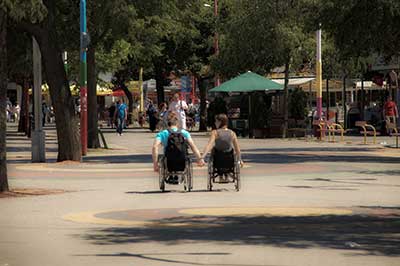As a lifelong wheelchair user who suffered a brain injury 32 years ago, I have been on my fair share of dates. From blind dates, to prom dates, and both short and long term relationships, I have seen it all. What have I learned throughout the process? Well, all of the able-bodied people I have dated had one thing in common: when they pictured the man of their dreams, they never pictured him permanently sitting down. So how did I change that picture in their mind? The answer is simple: I was just myself! Listed below are some of the tips I have learned along the way. They worked for me, and hopefully they will work for you, too.
- Put yourself out there. Get out of the house! Ask your friends and family where they met their husband or wife, and I bet you 99% of them say somewhere besides their own home. You have to put yourself in situations where you can meet new people.
- Be yourself. Accept yourself for who you are. If you are negative about your injury and make it seem like the worst thing on earth, most likely the person you are trying to date will view it that way, too. You had hobbies, interests, and talents pre- and post-injury: express them and see if you have something in common.
- The Elephant in the Room: When do you talk about the injury or disability? When it feels right. Tell the person you are dating like you would tell a friend. That’s what they usually start as initially anyway. As you get closer to each other go into more detail as needed. Most importantly make them feel comfortable with it. Chances are that you are the first person with your condition that they have dated. Most likely they have a lot of questions or concerns and they deserve some answers. Let’s face it; they are going to find out anyway if they spend the rest of their live with you, so you might as well take the time to discuss it. Just remember go at your own pace, you don’t need to spill the beans all at once. Questions will naturally come up over time.
- Know your limitations. If you struggle with cutting food and you are going to a restaurant, it’s okay to ask for it to be cut in the kitchen. Make sure the place you have selected is accessible enough for you. Everybody is different and so is every place you go. Do your homework ahead of time. Doing so will hopefully prevent your disability from becoming an issue. Be sure to have transportation sorted out ahead of time. If you encounter a situation where you need help with something, ask. It will help you avoid that awkward moment when the person you’re dating wants to help but isn’t sure if they should. Remember, they are just getting to know you. It’s your job to tell them what you need. Don’t expect them to automatically know.
- You are looking for a life partner, not a caregiver. Try to do as much as possible for yourself. There is a difference between needing help and abusing help. If you need help with your daily living needs, consider outsourcing some of it to keep the romance alive.
- Blind Dates: Be open and honest. No one likes surprises in that situation. Do you need to advertise your wheelchair or walker on match.com or e-harmony? Absolutely not. But I suggest you tell your date before you meet them for the first time. You don’t want to spend that whole first date talking about your condition instead of you! Get that stuff out of the way so you can get to know them.
Don’t let your nontraditional form of mobility get in the way of finding love. Nobody’s perfect. There are plenty of people out there who are in relationships despite their quirks or imperfections. The only difference between them and you is that some of yours are visible. Good luck in your search.





